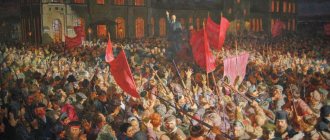What is character
This concept itself appeared in the era of Antiquity and comes from the Greek word “imprint”. Indeed, character manifests itself in a person’s behavior and leaves an imprint on him, making him unique and recognizable. And the stronger the character, the more vivid and unique the results of the individual’s activities are. But a person who is deprived of this power, that is, that inner “I” that controls behavior, is often called characterless. Not in the sense that he has no character, but because his actions are determined by external circumstances, and not by internal beliefs and moral qualities.
Character is a complex system of personality traits and qualities, so their combination and degree of expressiveness make each person unique. The character traits that make up its structure are usually divided into two large groups:
- biologically given (innate);
- formed in the process of personality development (acquired).
Concept of personality
Definition 1
Personality is a concept that reflects the social nature of a person for studying him as a subject, as a bearer of individual consciousness, etc.
In the context of psychology, a personality is an individual who acts as a subject of relations in society, as well as as a subject in his own conscious activity.
Personality also means a system of properties of an individual, which manifests itself in human activity.
According to R. Cattell, personality is a concept that characterizes a person’s behavior in a given situation. G. Allport believes that “a personality is something, and it does something.
Personality is what lies behind specific actions within the individual himself.”
Are you an expert in this subject area? We invite you to become the author of the Directory Working Conditions
Biological basis of character structure
The basis of character is the innate characteristics of higher nervous activity:
- speed of nervous processes;
- the strength of these processes;
- the ratio of excitation and inhibition in the nervous system.
The combination of these features constitutes the temperament or type of higher nervous activity of a person. There are only 4 types of temperament (phlegmatic, melancholic, sanguine and choleric), but in their pure form they are practically never found. These are complexes of traits, features of higher nervous activity that are present in humans in different combinations and varying degrees of severity. That is, if we take, for example, such a paired characteristic as introversion-extroversion, then a person can be more or less an extrovert or an introvert.
And there are several such characteristics that make up temperament. For example:
- rigidity and plasticity;
- emotional stability and emotional imbalance, sensitivity (sensitiveness), etc.
Due to their combination, a unique biological basis for character is created, and in the process of its formation, innate individual psychological traits are melted under the influence of the environment, mixed with social qualities, acquired properties, characteristics, and a completely unique personality is created.
Emotions
Emotions can be characterized as special individual experiences that have a pleasant or unpleasant mental coloring and are associated with the satisfaction of vital needs.
Among the main types of emotions are:
Mood – it reflects the general state of a person at a certain moment
The simplest emotions are experiences that are associated with the satisfaction of organic needs
Affects are violent, short-lived emotions that are especially manifested externally (gestures, facial expressions)
Feelings are a spectrum of experiences associated with certain objects.
Passion is pronounced feelings that cannot (in most cases) be controlled.
Stress is a combination of emotions and the physical state of the body
Emotions, especially feelings, affects and passions, are an invariable part of a person’s personality. All people (personalities) are very different emotionally. For example, by emotional excitability, duration of emotional experiences, predominance of negative or positive emotions. But the main sign of difference is the intensity of the emotions experienced and their direction.
Emotions have the characteristic feature of having a serious impact on a person’s life. Under the influence of certain emotions at certain moments, a person can make decisions, say something, and perform actions. As a rule, emotions are a short-lived phenomenon. But what a person sometimes does under the influence of emotions does not always give good results. And because our lesson is devoted to how to improve your life, then we should talk specifically about ways to influence it favorably.
It is important to learn to control your emotions and not give in to them. First of all, you need to remember that an emotion, whatever it is (positive or negative) is just an emotion, and it will soon pass. Therefore, if in any negative situation you feel that negative emotions are beginning to prevail in you, remember this and restrain them - this will allow you not to do or say something that you may later regret. If, thanks to some outstanding positive events in life, you experience a surge of joyful emotions, then also remember this; this practice will allow you to avoid unnecessary energy costs.
Surely, you are familiar with the situation when, some time after a moment of intense joy or delight, you feel some kind of inner devastation. Emotions are always a waste of personal energy. It’s not for nothing that the ancient Jewish king Solomon had a ring on his finger with the inscription: “This too shall pass.” Always in moments of joy or sadness, he turned his ring and read this inscription to himself in order to remember the short duration of emotional experiences.
Knowing what emotions are and the ability to manage them are very important aspects in the development of personality and life in general. Learn to manage your emotions and you will know yourself fully. Such things as introspection and self-control, as well as various spiritual practices (meditation, yoga, etc.) allow you to master this skill. You can find information about them on the Internet. You can learn more about what emotions are in our acting training.
But, despite the importance of all the personality properties discussed above, perhaps the dominant role is occupied by another of its properties - motivation, since it influences the desire to learn more about oneself and immerse oneself in the psychology of personality, interest in something new, hitherto unknown, even if you are reading this lesson.
Character structure: socially determined traits
Along with the innate, biologically given basis, character includes personality traits that are formed under the influence of society in the process of education and self-education, development and self-development.
Here it must be especially emphasized that a person is not a passive object of influence from society. He actively interacts with the environment, passes through himself everything that he receives from the surrounding reality, melts it in his inner world, and on the basis of this transformed experience his character is formed. Therefore, it is completely wrong to blame society (family, school, society as a whole) for shortcomings of one’s own character. We create ourselves and are responsible for both our positive and negative qualities. Proof of this is the example of children with completely different characters growing up in the same family.
Character has a rather complex structure, in which, along with the biological basis, there are 4 groups of qualities that are formed under the influence of the social environment.
Moral traits
Moral or ethical qualities of an individual are associated with socially accepted norms of behavior, values, ideals and attitudes. Moral character traits are revealed:
- in the social sphere;
- in communicating with people;
- in relation to them and to socially significant values.
The formation of these character traits is a complex process that occurs not only under the influence of a person’s immediate environment, but also under the influence of the media, fiction, traditions, beliefs and legends.
The variety of channels of influence and a person’s active interaction with them, as well as the uniqueness of his individual psychological makeup, provide a unique set of moral traits inherent in each person. Among the most significant are the following positive moral qualities:
- sense of duty – the ability to subordinate one’s personal desires to the needs of society;
- justice - the ability to distinguish between good and evil and the desire to protect good and fight against evil;
- honesty - loyalty to one’s obligations, the pursuit of truth, rejection of lies in one’s behavior;
- politeness - respect for other people, adherence to norms of behavior towards each member of society, regardless of social status or age;
- devotion - loyalty to another person, society, ideals, manifested even in the most difficult circumstances;
- friendliness is the ability not only to respect people, but also to have positive feelings towards them, a desire to support and help.
These are just the most basic positive moral qualities, in fact there are much more of them, you can continue this list yourself. Along with the positive ones, there are also negative traits, of which there are also many:
- deceit;
- coarseness;
- impudence;
- meanness;
- cowardice;
- greed, etc.
There are no perfect people. The peculiarity of the character of any person is that he may contain both positive and negative qualities, manifesting himself in different situations, creating a unique, individual appearance of a person. For example, a man who bravely rushes to save people from a burning building may be desperately afraid of going to the dentist.
Emotional Traits
The emotional qualities of a person are largely determined by the properties of temperament. For example, the increased excitability and expressiveness of a choleric person creates a peculiar emotional background, which is characterized by mood swings, falling in love, hot temper or excessive cheerfulness. On the other hand, in the process of education, serious attention is paid to developing the ability to restrain one’s emotions and control them.
Therefore, emotional traits are largely determined by the social factor and the corresponding norms of behavior accepted in society. For example, the excessive (in our opinion) emotionality of Italians is completely tolerated by their culture. But in Japan, open demonstration of one's emotions is considered not very decent.
The variety of manifestations of human emotions also determines the variety of emotional traits. Unlike moral qualities, it is difficult to distinguish between positive and negative ones among emotional ones. It's all about the degree to which these traits are manifested and their appropriateness. Agree, cheerfulness at a wedding is normal and even welcomed, but at a funeral it looks clearly indecent.
The following are the most common emotional personality traits:
- sensuality;
- passion;
- cold;
- cheerfulness;
- gloominess;
- amorousness;
- impressionability;
- restraint;
- aggressiveness;
- timidity, etc.
The manifestation of a person’s emotional qualities is largely related to the need for communication, therefore, less sociable introverts have a set of these qualities and their expression that differs from the extroverted personality type.
Strong-willed traits
The success of a person’s activities and how he is assessed in society largely depend on his ability to regulate and organize his behavior, that is, on his volitional qualities. They allow you to smooth out and overcome such negative character traits as laziness, timidity, shyness, indecisiveness, etc.
Volitional qualities are cultivated from childhood, formed under the influence of society and are closely related to the awareness of the need to subordinate one’s freedom to the demands of society. Will largely determines both the degree of a person’s activity and his ability to restrain himself. Most psychologists consider volitional qualities to be basic personality traits that largely determine the content of one’s character.
The leading volitional qualities include the following:
- endurance – the ability to restrain one’s emotions and impulsive actions;
- patience - the ability to maintain a high intensity of activity through volitional effort, despite fatigue or illness;
- purposefulness – conscious goal setting and the ability to achieve it;
- integrity – having stable principles and following them in any situation;
- independence – the ability to make independent decisions and organize activities to implement them;
- responsibility for one’s activities, behavior, ideas, etc.
There are many more strong-willed qualities than are listed here, but even these basic ones prove how significant this area of character is for a person.
Intellectual traits
Intellectual qualities of character are what distinguishes our cognitive activity and leaves an imprint on all aspects of the personality. Because these are not only mental abilities and qualities of attention and memory, but also interests, hobbies, and the direction of cognitive activity.
Intellectual traits largely determine a person’s ability to master new types of activities and the ability to independently organize the process of cognition. Basic intellectual traits include the following:
- qualities of thinking (level of intelligence, flexibility, creativity or standardization, logic, intuitiveness, etc.);
- curiosity – the need for new knowledge;
- resourcefulness - the ability to quickly find an answer to a complex question;
- intelligence;
- thoughtfulness;
- frivolity, etc.
Intellectual qualities not only influence all other character traits, but also participate in creating a unique image of a person. It’s not for nothing that they say: “You meet by your clothes, but you see off by your mind.”
Examples of strong, outstanding and historical figures
In fact, there are a lot of such people. It’s just that not everyone was lucky enough to make history. This only happens if a strong personality manifests himself at a very high level (national, global) or if, due to some circumstances, they become known to a wide circle of people.
- Genghis Khan is a Mongol nomad who conquered half the world. Without outstanding personal qualities, it would be difficult to even think about this.
- Alexander the Great - at one time also conquered half the world, however, he went from west to east, and Genghis Khan - from east to west, but that’s not the point.
- Napoleon - there is much more evidence about the scale of his personality than about the previous two figures. He went from lieutenant to emperor in 20 years, conquering people with the strength of his spirit and self-confidence. He almost became the emperor of the whole world (and who stopped him from doing this?).
- Minin and Pozharsky - these two people, thanks to their personal qualities, led the militia at the beginning of the seventeenth century and expelled the Polish occupiers from Moscow.
- Peter the Great is a very odious personality, who during his not very long life made Russia a maritime (great) power. So much energy and confidence came from him that it made it possible to accomplish the impossible.
- Catherine the Second is a native German who, having become our empress, thanks to her irrepressible energy and iron will, made Russia truly Great.
- Putin Vladimir Vladimirovich - who can say that this is not the strongest personality in current world politics. Of course, his descendants will judge his actions, but it is already clear that he will go down in history along with the above-mentioned comrades.
There are people who are considered strong not because of what they achieved in life, but because they were able to remain true to themselves on the verge of death:
- Ivan Susanin - forced the Polish occupiers to waste time leading them through the swamps, while knowing that he would be executed for this.
- Alexey Maresyev , a pilot, was shot down during the Second World War and spent many days getting back to his people with shattered legs. After that, he returned to duty and flew on prosthetics, amazing all his contemporaries and descendants with the strength of his character.
- Magomed Nurbagandov is a policeman from Dagestan who, in the face of death, did not lose his restraint and did not give up his principles. He was executed in front of a video camera by a group of bandits. But he was not broken.
Character structure: content and form
The same character traits manifest themselves differently in different people. Therefore, content and form are distinguished in its structure.
The content of character is determined by a person’s basic values, attitudes, ideals, and habits formed in the process of development. Content is a product of personality formation, and it reflects the influence of the social factor to the greatest extent. The determining role in the content of character is played by worldview as a person’s system of views and his attitude towards people, the world and his place in this world.
However, people differ not only in the set of traits, but also in the form of their manifestation in activity, and in the type of behavior in society. Currently, attempts to classify sociotypes have become popular. Despite various approaches to such classifications, it is not possible to find an ideal one that would suit all people. No type matches the real character of a person 100%. Why? Because the type of behavior as a form of manifestation of character is unique for each person. It's like fingerprints - it never repeats itself.
To understand the content of a person’s character, you need to eat a pound of salt with him. And the uniqueness of the form is visible and noticeable, if not at first glance, then certainly at the second. Even if a person is closed and secretive, this is also noticeable at first glance, and it is secrecy that will be a form of manifestation of his character.
Character types, their expression, “weak points”
Currently, there are many classifications of character. Particularly interesting and meaningful are those that arose in the border area at the intersection of psychology and psychiatry. They contain the experience of talented clinical scientists who worked directly with people, observed their behavior, studied biographies, talked with their relatives, and helped in difficult life situations and problems. Here you can find such names as K. Jung, E. Kretschmer, P. B. Gannushkin, K. Leongard, A. E. Lichko, M. E. Burno, M. Z. Dukarevich and others. The first classifications contained only two types (K. Jung, E. Kretschmer), nowadays there are many more of them.
We will focus on eight main types, which, with some variations, are found among most authors. Specific examples and illustrations will be taken from the observations of the same authors, fiction, our own personal experience and the stories of other people.
People differ in the degree to which their character traits are expressed. In one they are very noticeable, in the other they seem to be smoothed out, softened. The best way to get to know characters is through examples of their expressed degrees (accentuations), which is what we will do in this book. By the way, such pronounced characters are observed in more than half of the population. This means that in every family there is likely to be a person with an accented character. If we talk about teenagers, then “sharp corners” of character are found in most of them, although they usually smooth out over the years.
In general there are no bad and good characters. Each character has its own strengths and weaknesses. Strong properties are usually visible, they speak for themselves, but weak ones often still need to be recognized.
Talking about character weaknesses brings us to the very important concept of character weaknesses. Such a “place” means a person’s increased sensitivity, or vulnerability, to certain conditions. Such conditions are different for different characters. One person finds it difficult to bear the loss of attention from loved ones, another finds it difficult to bear the restriction of his freedom, and a third cannot bear the burden of responsibility and high expectations. When there is a load on a weak point of character, a person gives a negative reaction. This can be expressed in different ways, from withdrawing into deep resentment to “breaking dishes” and hysterics. If stress on a weak point is repeated frequently and for a long time, then the experience of trouble intensifies, sometimes leading a person to a state of “impossibility”: a child runs away from home, a spouse gets divorced, an employee submits a letter of resignation.
Hence it is clear that knowledge of the “weak points” of each character is of invaluable practical importance. It helps to behave competently with a person, preventing unnecessary complications in the family and at work, and mistakes in raising a child. We will definitely dwell on the weak points of each character when getting to know individual types.










